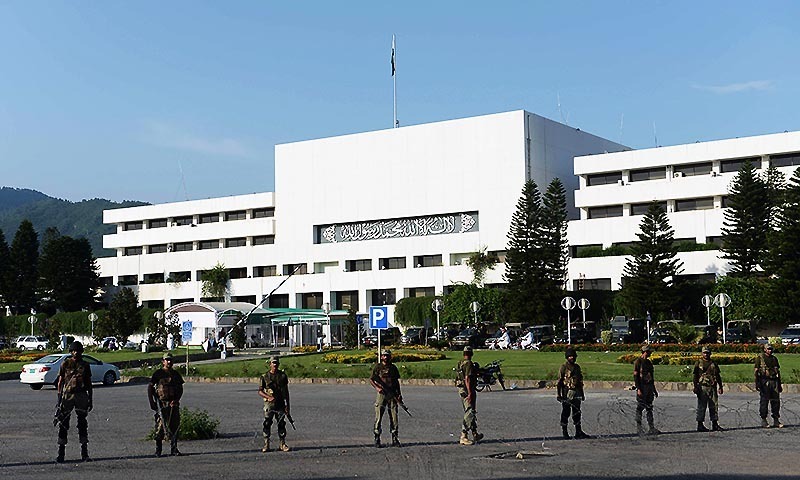A state is a combination of institutions. In the book “Why Nations Fail” the authors prove a thesis that history teaches us a lesson that when Institutions of a state fall, the nations fail. In this book, they provide many examples from history and the modern age to prove their stance. While presenting their research-based analyses on reasons for the failure and success of countries, they, again and again, write about ‘nature and performance of the institutions are the determining factors for nations’.
This is a read-worthy book for every student. Unfortunately, Pakistan’s political elite is reluctant to concede this reality. Instead of strengthening economic, political, and security institutions, have decided to weaken them. The current political imbroglio in our country is a result of that shortsightedness where everyone is striving for one’s own room in the echelon of power at the cost of state interests. All the state institutions are under extreme threat to be collapsed.
Read more: Allies of Pakistan’s ex-PM Khan resuming march on Islamabad
This is not the first time in our history that our institutions are failing
We have witnessed this kind of failure in 1971 when Dhaka fell. This was not merely the fall of Dhaka, it was the fall of the state, Pakistan. Then Pakistan could not survive because its institutions had failed to perform their functions. The legislature could not conduct the session of newly elected members of parliament. Similarly, it remained to fail in allowing the majority political party to form the government. The majority party was the Awami League under the leadership of Sheikh Mujib-ur-Rehman from East Pakistan. Because it was martial-law at that time in the country, Judiciary also failed by not taking any action for bringing the people above law under the law. The country was in condition of an-legislature, san-executive and toothless judiciary. The whole executive power was in the hands of an insane chief-martial, Yahya Khan.
Instead of complying with his promises of handing-over power to publicly elected people, he used his power to crush the people and public opinion in East Pakistan. He should have bridged the gaps between the then-political elite but he failed. In this way, the last functional institution at that time, Pakistan Military, was pushed into a blind alley. Orders for military operations in East Pakistan to suppress the public sentiments proved the last nail in the coffin of the state’s integration. In December 1971, all the state institutions failed in performing their role. Consequently, the nation fell.
At present, once again a situation of political stalemate has emerged and the political elite is failing in breaking the impasse. After the event of April 10 this year, constant socio-political chaos is continuing. The largest political party is our national assembly and the government is losing public trust. PDM brands Imran Khan, leader of PTI, as a fascist and cause of the disturbance, fitna, in the country.
On the other hand, PTI supremo blames the government as foreign puppets and a gang of plunderers. They are at loggerheads with each other. The situation gets to its lowest ebb after the attempt of IK’s assassination in his long-March towards Islamabad. Here, once again institution of law enforcement, the Punjab Police, fails when it could not register the first information report according to law. There is no denying the fact that political and law enforcement institutions have failed in Pakistan. There remain two and the most critical institutions in Pakistan’s political culture, the judiciary and the Pakistan Army.
In a famous book, Pakistan: A Hard Country, Anatol Lieven, the author, proves that Pakistan Military has been a savior of the country. There is not an iota of doubt that Pak-army has survived many times the country from being collapsed. May it be an earthquake, flood, terrorism, insurgency, or aggression from any external power, Pakistan Military has proved its steel in all the fields and saved the country. In the current confusing times of fifth-generation warfare, the military institution is also under attack from internal factors. Some politicians allege the military for its role in politics. The next moment, when they come into power they appreciate the role of the military.
Read more: Pakistani celebrities school Irfan Pathan on ‘grace’ tweet
But the real point of concern is the image of the institution in people. At present, the military’s image is being portrayed like that of 1971. This time, our beloved land cannot afford the tragedy like that of 1971. So, the military institution needs once again to be a proven savior of the state by complying with the wills and wishes of people by living within its constitutional bounds.
The other functional institution is Pakistan’s Judiciary. In the near past, it has proved that any unconstitutional act will not be tolerated. We have examples of annulling the unconstitutional ruling of two deputy speakers of two legislatures. Similarly, it has been active in matters of human rights in the country. The hope gets strength when the Supreme Court issues orders for registering an FIR in the case of Ik’s assassination. The second last functional institution was also under attack during the previous regime when a presidential reference was filed against Justice Qazi Faiz Isa. But, it survived. The present political scenario is a litmus test for Judiciary. If it succeeds in implementing rule of law, the country will survive falling. Because nations fall when Institutions fail.
The writer has done an LLB (Hons) from Punjab University Law College. The views expressed in this article are the author’s own and do not necessarily reflect the editorial policy of Global Village Space.














